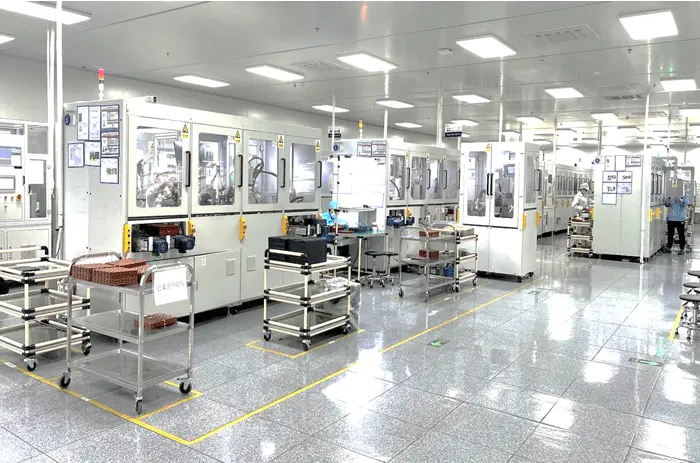Our research and development team boasts 11 years of industry experience and consists of 300 seasoned R & D engineers. They possess not only extensive technical expertise but also remarkable innovation capabilities of the BESS energy storage system. This team is dedicated to enhancing energy efficiency, pushing the boundaries of new energy products through innovative engineering technologies, intelligent systems, and high-efficiency solutions.

FPR, one of the professional battery energy storage system manufacturers in China, aims to provide renewable energy while emphasizing the enhancement of energy efficiency. Our new BESS wholesale energy products are designed to be more efficient and reliable energy solutions, catering to the ever-growing energy demands of today. By optimizing energy utilization, we assist clients in reducing energy storage system costs, minimizing waste, and achieving greater returns both economically and environmentally.

Sustainability and Environmental Friendliness: Energy storage companies are committed to providing eco-friendly and sustainable energy solutions with high-quality products like battery cell pack module and backup battery power station. This sustainability makes them highly regarded, especially in the face of increasingly stringent environmental regulations, helping to reduce carbon footprints and dependence on finite natural resources.
Efficiency and Cost Savings: BESS Energy storage technologies offer efficient energy storage and release mechanisms, which reduce energy waste and costs. This provides significant economic and energy benefits to customers, making these energy storage systems competitive in a fierce market.
Flexibility and Demand Response: BESS Energy storage systems including stationary storage battery systems are highly flexible and can be adjusted to match fluctuations in energy demand. This flexibility allows energy storage companies to better adapt to evolving market and customer needs, ensuring reliable energy supply.
Grid Regulation and Balancing: BESS system is employed for grid regulation by storing surplus energy during low-demand periods and discharging it during peak demand, thus enhancing grid stability and reliability.
Integration of Renewable Energy Sources: With the continuous growth of renewable energy sources like wind and solar, BESS battery energy storage system stores excess energy for use during high-demand periods, ensuring stable power output.
Backup Power and Emergency Supply: BESS battery storage system serves as a backup power system, ensuring uninterrupted power supply during outages or emergencies, crucial for sustaining critical facilities and services.
Microgrids and Isolated Systems: In remote areas or places lacking stable power supply, BESS, combined with renewable energy sources, establishes microgrids or isolated systems to deliver reliable electricity.
Electric Vehicle Charging Infrastructure: BESS energy storage system functions as energy storage for electric vehicle charging stations, smoothing out charging demands and reducing impacts on the grid.
Industrial and Commercial Applications: In industrial and commercial sectors, BESS battery system is widely used to reduce energy costs, enhance energy efficiency, and provide backup power support.
Charging: When excess electricity is available, such as from a renewable energy source like solar panels or during periods of low electricity demand, the battery storage energy system begins the charging process. The electricity is directed to the battery cells, where it is converted into chemical energy through electrochemical reactions.
Battery Cells: Battery cells are the fundamental units that store electrical energy in the form of chemical energy. Common types of batteries used in BESS energy storage systems include lithium-ion, lead-acid, and flow batteries. In lithium-ion batteries, for example, lithium ions move from the negative electrode (anode) to the positive electrode (cathode) during charging.
Battery Cells: Battery cells are the fundamental units that store electrical energy in the form of chemical energy. Common types of batteries used in energy storage systems include lithium-ion, lead-acid, and flow batteries. In lithium-ion batteries, for example, lithium ions move from the negative electrode (anode) to the positive electrode (cathode) during charging.
Inverter: The inverter is a crucial component that converts the direct current (DC) stored in the battery into alternating current (AC) for use in homes, businesses, or the electrical grid. This BESS storage system also plays a role during charging, converting AC from the grid or renewable sources into DC for storage in the battery.
Discharging: When electricity is needed, such as during periods of high demand or when renewable energy generation is low, the BESS battery storage system begins the discharging process. The chemical energy stored in the battery cells is converted back into electrical energy, and the inverter transforms it into AC for use.
Power Distribution: The electricity generated during discharging can be used to power homes, businesses, or be fed back into the electrical grid. Advanced battery storage systems may have additional features such as grid services, allowing them to provide ancillary services to the grid, stabilize voltage, and enhance grid reliability.
A Battery Energy Storage System (BESS) is a technology that stores electricity in batteries for later use. This battery storage energy system helps balance supply and demand, integrates renewable energy sources, provides backup power, and supports various applications in industries, commercial settings, and electric vehicle infrastructure.
Batteries store electrical energy in the form of chemical energy. During charging, this energy is converted into chemical potential energy by driving a chemical reaction. When the energy storage battery discharges, the chemical energy is converted back into electrical energy, powering devices or systems.
BESS energy storage systems are valuable for their ability to store excess energy during low-demand periods and discharge it during peak demand, enhancing grid stability. They also facilitate the integration of renewable energy sources, provide backup power during emergencies, and support various industrial, commercial, and residential applications.